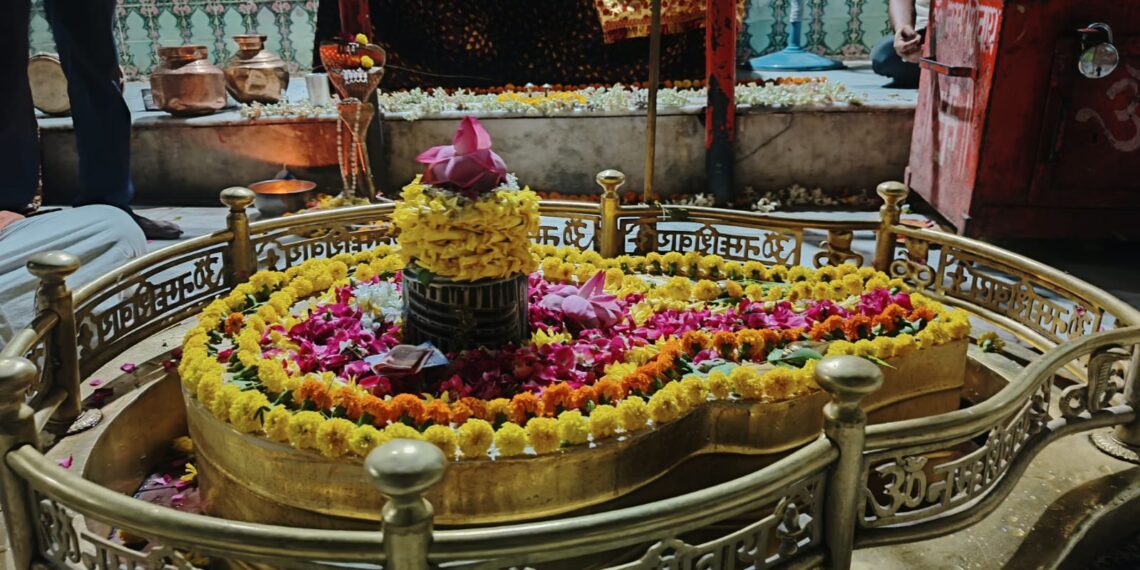The Lodheshwar Mahadev Temple is situated in Mahadeva village, Ram Nagar tehsil, Barabanki district, Uttar Pradesh, on the banks of the sacred Ghaghra River. People come here to worship Lord Shiva, known here as Lodheshwar Mahadev, who is believed to fulfill the wishes of those who pray with devotion. The old temple, standing close to the river, honors Shiva as the divine protector of this land. Parvati, called Gauri, is also believed to reside here alongside him.
History of Lodheshwar Mahadev Temple
The Lodheshwar Mahadev Temple is believed to have been established in the Mahabharata period, said to be by the Pandavas during their exile. Barabanki, connected to ancient Hindu stories and tied to dense forests called Bara Van, is a sacred area. Local tradition holds that Pandit Lodheram Awasthi, a kind Brahmin, saw Shiva in a dream and found the shivling in a pit while working his field. Historical records list it as one of the rarest of 52 shivlings at Shakti Peethas across India, tied to the Mahabharata.
The temple sits on level ground and is reached by walking 10 stone steps. British writers in the 1800s noted its ancient look. After India’s independence in 1947, a local trust took over its care. Renovations in the 1980s preserved its original appearance. Saints long praised Shiva’s glory here, making the temple well known. Today, many visit this sacred site in Barabanki.
Legends of Lodheshwar Mahadev Temple
The temple has many stories about Shiva and local beliefs. One says that during the Mahabharata, the Pandavas held a Rudra Mahayagya near the Ghaghra at Kulchhaattar, 2 km north, and set up this shivling. People believe praying with a true heart brings health, wealth, and peace. Another story tells how Lodheram Awasthi, childless, dug a pit where water drained and found the shivling, which bled when struck, a mark still visible today. Shiva blessed him with four sons, and villages named Mahadeva, Lodhaura, Gobarha, and Rajnapur exist nearby.
A well called Pandav-Kup, from the Mahabharata, is believed to have water that heals ailments. Some say the shivling’s power fulfills wishes for those who offer Ganga water. Many feel the temple’s air carries Shiva’s protective power, making it a place of care.
Some say offering Ganga water to the shivling seven times makes wishes come true. Others say the temple’s water and air carry Shiva’s guarding power, making it a place of divine care.
Rituals and Festivals
The temple comes alive for festivals. Shivratri, in February or March, is big, with all-night songs and Ganga water offerings. Sawan, in July or August, honors Shiva with daily lamp offerings. The name Lodheshwar Mahadev itself means that no wish goes unfulfilled here. Devotees feel a deep sense of peace as soon as they enter the temple. Many come to pray for marriage or children, and when their wishes are granted, they offer belpatra, Gangajal, milk, and bells to Baba. Even a simple pot of water is said to please him.
There is also a tradition of offering silver items like bells, snakes, and tridents to Baba Lodheshwar. Devotees believe that silver offerings quickly win his favor, but Baba is pleased even with just a pot of water. A local fair in November or December sees cattle trading. Shivratri’s songs fill the yard with faith. The Ghaghra ghat, said to wash sins, pulls crowds nearby. Folks offer milk, bel leaves, coconut, and silver bells. Some chant the Mahamrityunjay Mantra five times, taking 2 hours, for special wishes.
Information for Travelers
Visiting Hours and Entry: The temple is open every day. During summer, it welcomes visitors from 5:00 AM to 9:00 PM, while in winter the hours are 5:30 AM to 8:30 PM. On Mondays, the temple remains open until 10:00 PM. Entry is free, but offering prayers generally requires a contribution of ₹20 to ₹100. Photography is not permitted inside the main hall. A unique feature of this temple is that even those who do not enter can view the shivling from outside.
Only visitors dressed in traditional Indian attire, such as a dhoti or saree, are allowed near the shivling. Within the temple grounds, behind the main sanctum, there are several smaller shrines where akhand jyots, or eternal lamps, burn continuously, fueled by desi ghee. Devotees whose wishes are fulfilled often return to light a lamp, which can range in cost from just over one rupee to as much as one lakh rupees.
How to Get There:
Air: Chaudhary Charan Singh Airport in Lucknow is about 77 kilometers off, with flights connecting to Delhi (around 1 hour) and Mumbai (around 2 hours). Taxis take approximately 2 hours to reach the temple.
Train: Budhwal Junction Station is 3 kilometers from Ram Nagar tehsil, with Mahadeva 5 kilometers off, connecting to Lucknow (about 1 hour) and Delhi (about 6 hours). Auto-rickshaws are available for local travel.
Road: Mahadeva lies 5 kilometers from Ram Nagar town via Fatehpur-Suratganj-Ramnagar Road. Buses run between Lucknow and Ram Nagar. Auto-rickshaws operate within the village.
Best Time to Visit: October to March is pleasant, with temperatures between 15–25°C. Weekdays are generally quiet, while Shivratri and Sawan attract large crowds of 10,000–30,000 visitors, so it is advisable to arrive early.
Nearby Attractions:
Parijaat Tree: 10 km off, a sacred tree from the Mahabharata.
Deva Sharif Dargah: 20 km off, a Sufi shrine from the 13th century.
Naimisharanya: 60 km off, a pilgrimage site from ancient times.
Ghaghra Ghat: Right there, a bath spot for prayers.
Final Words
Lodheshwar Mahadev Temple in Barabanki is a revered site where devotees from all over India gather to seek blessings and fulfill their wishes. With its rich history and spiritual significance, it remains a must-visit destination for pilgrims and visitors across Uttar Pradesh.











